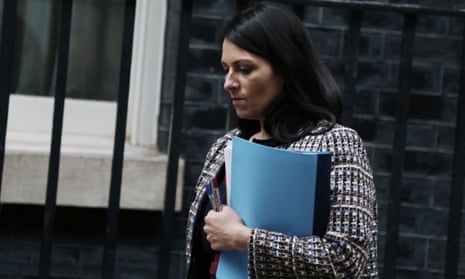A new policing bill that will be debated this week risks deepening racial and gender disparities in the justice system while forcing professionals to betray the trust of vulnerable people, hundreds of experts and a report have warned.
In a letter to the home secretary, 665 GPs, nurses, social, youth and outreach workers and teachers have warned that the police, crime, sentencing and courts bill is “oppressive” and would force frontline professionals to betray the trust of vulnerable people and become complicit in surveillance, ahead of a debate in the House of Lords this week.
A separate report has said it will put vulnerable young women at further risk of threat further violence, abuse and exploitation.
The government wants to put a statutory duty on public agencies, such as healthcare and education providers, to reduce and prevent serious violence by disclosing information on service users.
In the letter to Priti Patel, to be sent on Monday, signatories say they are “appalled” by the proposals, which they believe “directly conflict with our duties and will actively put people we work with in harm’s way”.
They write: “[T]his bill will hinder our ability as frontline workers to effectively support the people with whom we work by eroding relationships of trust and duties of confidentiality.
“Most importantly, it will expand the criminalisation, surveillance, and punishment of already overpoliced communities.”
The bill proposes to increase the sentence length for assaults on emergency workers from 12 months to two years, but a report by Agenda, the alliance for women and girls at risk, and the Alliance for Youth Justice said assaults on emergency workers already make up 17% of total offences leading to prison sentences for black young women aged 18-24, compared with 6% for their white counterparts.
Niya, a young woman who was charged with assaulting a police officer when she was 18, said she was suicidal and in a forced marriage.
Her family beat her then called the police when she said she wanted to leave the marriage, she said. Surrounded by officers who told her she would be arrested, she panicked and kicked an officer.
“I think I would have reacted differently if they had backed off, but because they were crowding over me and not giving me any space, after going through what I just did, it was too much at that time,” she said.
In the letter, the experts warn that proposed serious violence reduction orders will give police an “individualised, suspicionless” stop and search power with minimal safeguards, with people likely to face “intrusive monitoring”. The report says young women coerced in relationships or experiencing criminal exploitation could face up to two years’ imprisonment because they “ought to have known” someone in their company was in possession of drugs or weapons.
Jemima Olchawski, the CEO of Agenda, said vulnerable young women run the risk of being driven into a system that “punishes them for their response to trauma”. She added: “Once in the criminal justice system they have limited access to specialist support and are left to deal with their entrenched and complex experiences of trauma, putting them at heightened risk of repeated offending.”
Pippa Goodfellow, director of the Alliance for Youth Justice, said the pandemic had put vulnerable girls and women at greater risk, which could drive up offending. “It is vital that systems and services work together to meet these growing and emerging needs, whilst standing firmly against punitive measures that will criminalise those most in need of support,” she said.
Jun Pang, policy and campaigns officer at Liberty, said the bill would “lead to harassment and oppressive monitoring of young people, working-class people and people of colour, especially black people” and funnel more people into the criminal punishment system.
A petition opposing the bill’s proposals has been signed by almost 600,000 people, while more than 30,000 people have written directly to the prime minister to object.
